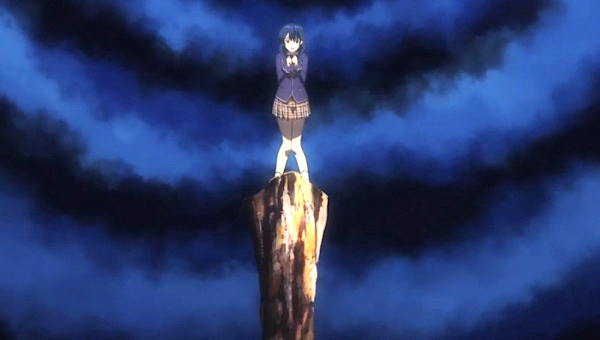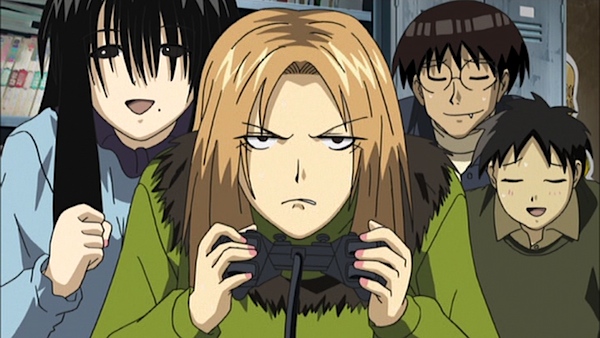A couple times a month, the Fandom Post community suggests and votes on a new top five list about something in anime, most often from the current season. It’s our way of highlighting something fun or interesting or strange—or even meaningful—about what’s airing now, or about anime in general.
The fish out of water. Mark it up to whatever suits your perspective of Japanese society—the alienation of urban immigration that defined Japan for decades, the isolation of the individual outsider in a conformist culture—but the concept of a person, often young, thrust into an unfamiliar environment for the sake of dramatic and comedic tension is a routine and entertaining story in anime. (Never mind that this is also a popular and understood theme in most story traditions the world round, in any culture that has grappled with change.) Easy enough, this is most custom in many school-age stories, of the new classmate, the new kid in town, the alien invader. But it can be a peer or contemporary dragged into a world parallel and in seeming contrast to their own, a naive innocent ignorant of class distinction, a refugee looking for a new start, or a fellow citizen unmoored from the world they thought they knew and desired.
Here are five of our current favorite examples, touching on several iterations of the unsuspecting fish…
•••
#5: Hotaru Ichijou (Non Non Biyori)
Hotaru’s the most familiar of this phenomenon, the new kid from the city transplanted to the countryside. (Her doppelganger the kid from the sticks marooned in the big city; see #2.) But she exists for utilitarian purpose in the story of Non Non Biyori: she is, at least in its first season, our guide to this odd collection of small town residents—and of most importance, her fellow classmates in her one-room school (taking place inside a dormant multi-room school), for they are the free-roaming and unpredictable elements that most make Hotaru seem alien. Her charm, however, is innocently showing the others as fellow fish out of water when they attempt to beguile Hotaru with incomplete knowledge of the wealthier and more connected big city world she came from, and that they wish to experience.
#4: Aoi Miyamori (Shirobako)
In Aoi’s case, the strange land in which she feels at times a stranger was a known thing: the anime industry she was eager to become a part of since high school. What leaves her adrift for certain phases through the tale of Shirobako, feeling like an interloper, is that she is not certain what part of that industry she should make her home—if there’s a home to be had at all. In this way she is again a useful guide to the many cogs in the wheel of anime production. But the meaning of Shirobako is that everyone else, her friends from high school, her colleagues of all ages and experiences, experience or have experienced the same indecision. Finding a purpose, or just being comfortable with the one opportunity gives you, is what Aoi’s journey is about. That we should all be as lost.
#3: Rokurou “Rock” Okajima (Black Lagoon)
And so it is with Rock. Opportunity shined upon bland and restless salaryman, Rokurou Okajima, in the form of south seas modern day pirates, the smugglers of the Black Lagoon Company. In the violent backwater of Roanapur that the crew operates from, most residents are landward fish: outcasts, criminals on the run, misfits, all trying to keep their heads down in an unpredictable place. But none perhaps more than Rock, a Japanese middle class businessman with no violent past or inclination. Yet it’s a world he embraces even as he tries to reform the blights available to his quick-talking influence, for he was a negotiator by trade, and negotiation is very often the name of the game in Black Lagoon’s work. Apparent in the beginning, after some time Rock seems the least appropriate example of this topic, in fact, as he and his adopted world meet in the very messy middle.
#2: Megumi Tadokoro (Food Wars: Shokugeki no Soma)
Megumi is perhaps what we are most familiar with. Talented but naive, the girl from the small town thinks she can make it in the outside world against better equipped and more motivated (or less moral) rivals. And more than often enough, she has abilities that even she does not realize are a real leg up on the conceited competition. Megumi’s not quite Katniss or Rey, but when expulsion from the best culinary school in the country is as good as death for a poor girl like her, she responds with similar reservoirs of strength and cunning. She is one of the most entertaining types of this theme, the one that we root for, and who finds ways to succeed, because she’s a fish out of water. That unique perspective is her strongest power of all.
#1: Saki Kasukabe (Genshiken)
In some sense the great Saki Kasukabe is similar to Black Lagoon‘s Rock, as the “normal” young woman is dragged into a den of otaku and forced to interact with them for the sake of her seeming shallow interest in her attractive otaku boyfriend (childhood friend thing; she has little choice). She is out of her depth from the start, but nor does she much care, dismissive but tolerant of their strange rituals and infatuations. The attraction of Saki, however, is that even as she becomes close friends with all in the Genshiken club, and entertains rare parts of their industry in order to stay so (cosplay, mostly), she never completely compromises her own identity and place. She is and will always be the strange one out, and for the story of Genshiken, she provides the lens that gives every other character his or her humanity.
•••
Join us next time for anthropomorphic theater. To have a say in what makes it on that list, and the next list after that, check out the forum thread, read up on the rules, and join the Fandom Post Anime List Project today!





